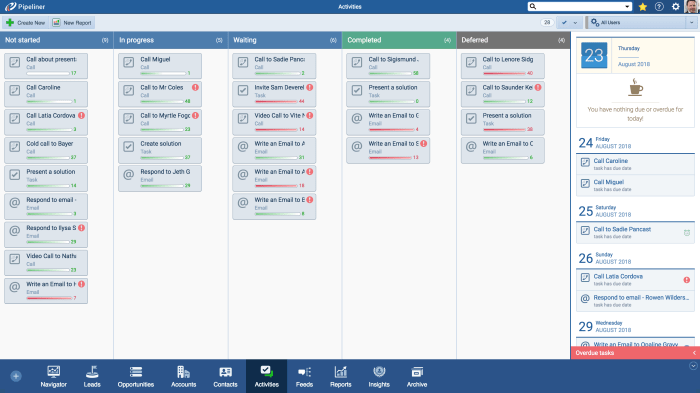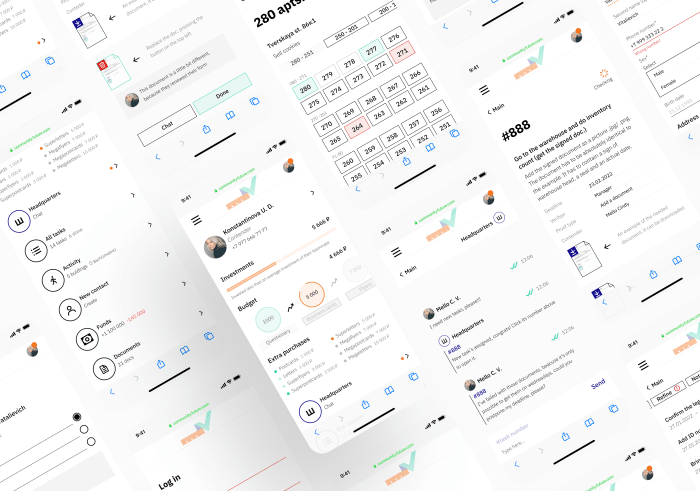Crm and task management software – In today’s dynamic business environment, efficient organization and streamlined workflows are paramount to success. This is where Customer Relationship Management (CRM) and task management software step in, offering powerful tools to boost productivity and enhance customer relationships. While often used separately, integrating CRM and task management systems can create a truly synergistic effect, optimizing both sales processes and team collaboration.
Understanding CRM Software: Crm And Task Management Software
CRM software is designed to centralize and manage all interactions with current and potential customers. It provides a holistic view of each customer, encompassing their purchase history, communication logs, and support tickets. This consolidated information empowers businesses to personalize interactions, anticipate customer needs, and ultimately, improve customer satisfaction and loyalty. Key features often include:
Core CRM Features:
- Contact Management: Storing and organizing customer details, including contact information, purchase history, and communication preferences.
- Sales Management: Tracking leads, managing sales pipelines, and forecasting revenue.
- Marketing Automation: Automating marketing tasks like email campaigns, social media updates, and personalized messaging.
- Customer Service: Managing customer support tickets, tracking resolutions, and improving response times. This often includes features like help desk software integration.
- Reporting and Analytics: Generating reports on key metrics such as sales performance, customer engagement, and marketing ROI.
- Integration Capabilities: Connecting with other business applications like email platforms, accounting software, and e-commerce platforms.
Popular CRM platforms include Salesforce, HubSpot, Zoho CRM, and Microsoft Dynamics 365. The choice of CRM depends heavily on the size and specific needs of the business.
The Role of Task Management Software
Task management software focuses on streamlining workflows and boosting team productivity. It helps teams organize, assign, and track tasks, ensuring projects stay on schedule and within budget. Effective task management software offers features like:

Source: pipelinersales.com
Essential Task Management Features:
- Task Creation and Assignment: Creating tasks, assigning them to team members, and setting deadlines.
- Project Management: Organizing tasks into projects, setting milestones, and tracking progress.
- Collaboration Tools: Facilitating communication and collaboration among team members through features like comments, file sharing, and real-time updates.
- Time Tracking: Monitoring time spent on tasks to improve efficiency and project budgeting.
- Prioritization and Scheduling: Prioritizing tasks based on importance and urgency, and scheduling them effectively.
- Reporting and Analytics: Tracking team productivity, identifying bottlenecks, and measuring project performance.
Examples of popular task management software include Asana, Trello, Monday.com, and Jira. The selection often depends on team size, project complexity, and preferred workflow styles.
Integrating CRM and Task Management: A Powerful Synergy
The true power lies in integrating CRM and task management software. This integration creates a seamless workflow, eliminating data silos and improving overall efficiency. Key benefits include:
Benefits of Integration:, Crm and task management software
- Improved Team Collaboration: Centralized information allows teams to work together more effectively, reducing confusion and improving communication.
- Enhanced Customer Service: Quick access to customer information allows for faster and more personalized support.
- Streamlined Sales Processes: Tasks related to sales, such as follow-ups and proposal creation, are seamlessly integrated into the CRM workflow.
- Increased Productivity: Automation of tasks and improved organization leads to increased team productivity and reduced workload.
- Better Data Visibility: A unified view of customer interactions and task progress provides valuable insights into business performance.
- Improved Accountability: Clear task assignments and progress tracking enhance accountability and responsibility within the team.
Many CRM and task management platforms offer native integrations or utilize APIs (Application Programming Interfaces) to connect with each other. This allows for seamless data transfer and automation of tasks.
Choosing the Right CRM and Task Management Solution
Selecting the appropriate software depends on several factors, including:

Source: behance.net
Factors to Consider:
- Business Size and Needs: Small businesses might benefit from simpler, more affordable solutions, while larger enterprises require more robust and scalable systems.
- Budget: Pricing models vary widely, from subscription-based services to one-time purchases.
- Integration Capabilities: Ensure the chosen software integrates with existing systems and applications.
- User-Friendliness: The software should be intuitive and easy to use for all team members.
- Scalability: The system should be able to adapt to the growing needs of the business.
- Customer Support: Reliable customer support is crucial for addressing any technical issues or questions.
Frequently Asked Questions (FAQ)
- Q: What is the difference between CRM and task management software? A: CRM focuses on managing customer relationships and data, while task management software focuses on organizing and tracking tasks and projects.
- Q: Do I need both CRM and task management software? A: While not strictly necessary, integrating both can significantly improve efficiency and productivity, particularly for businesses with sales and customer service teams.
- Q: How do I choose the right CRM and task management software for my business? A: Consider your budget, business size, specific needs, integration requirements, and user-friendliness.
- Q: What are the benefits of integrating CRM and task management software? A: Improved collaboration, enhanced customer service, streamlined sales processes, increased productivity, and better data visibility.
- Q: Are there free CRM and task management options available? A: Yes, many platforms offer free plans with limited features, or freemium models with paid upgrades for advanced functionalities.
- Q: How can I ensure data security with CRM and task management software? A: Choose reputable providers with robust security measures, such as data encryption and access controls. Regularly review and update security settings.
Conclusion
Implementing CRM and task management software, particularly when integrated, is a strategic move for businesses seeking to enhance efficiency, improve customer relationships, and drive growth. By carefully considering your business needs and selecting the right solutions, you can unlock the full potential of these powerful tools and gain a significant competitive advantage.
References
Call to Action
Ready to streamline your workflows and boost your business performance? Explore the leading CRM and task management solutions today and discover how they can transform your operations!
Commonly Asked Questions
What are the key benefits of using integrated CRM and task management software?
Key benefits include improved customer relationship management, enhanced team collaboration, increased productivity, better resource allocation, streamlined workflows, and data-driven decision-making.
How much does CRM and task management software typically cost?
Pricing varies widely depending on the specific software, features included, and the number of users. Options range from free plans with limited functionality to enterprise-level solutions with substantial monthly or annual fees.
What are some examples of popular CRM and task management software?
Many platforms offer integrated solutions or allow for third-party integrations. Examples include Salesforce, HubSpot, Zoho CRM, and Microsoft Dynamics 365, each with varying strengths and weaknesses.
Is it difficult to implement CRM and task management software?
Implementation complexity depends on the size and complexity of the business and the chosen software. Simpler systems can be implemented relatively quickly, while more comprehensive solutions may require more time and resources for setup and training.
